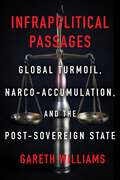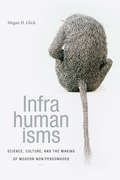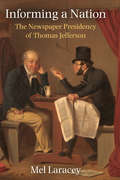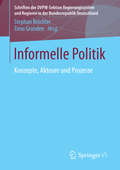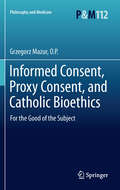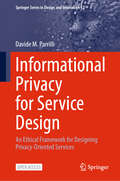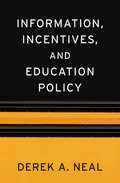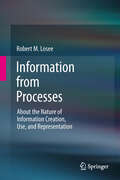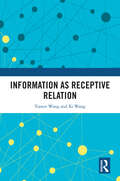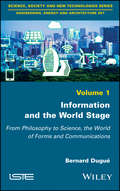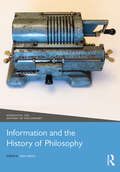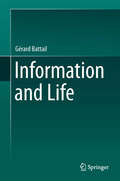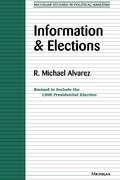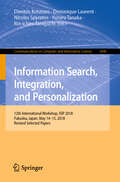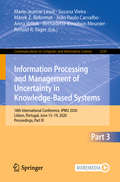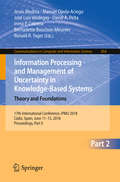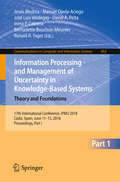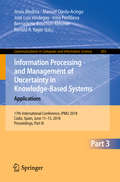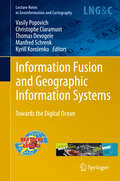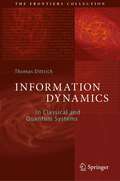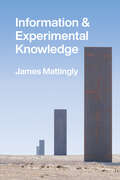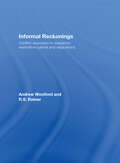- Table View
- List View
Infrapolitical Passages: Global Turmoil, Narco-Accumulation, and the Post-Sovereign State
by Gareth WilliamsThis book makes a case for infrapolitics as an enactment of intellectual responsibility in the face of a tumultuous world of war and of technological value extraction on a planetary scale. Infrapolitical Passages proposes to clear a way through some of the dominant political determinations and violent symptoms of contemporary globalization. In doing so, Gareth Williams makes a case for infrapolitics as an enactment of intellectual responsibility in the face of a tumultuous world of war and of technological value extraction on a planetary scale. The book offers a theory of globalization as a gigantic, directionless crisis in humanity’s symbolic organization, as well as a theory of global economic warfare as the very positing of directionlessness and, at the same time, facticity. Williams’s infrapolitics stands at a distance from the biopolitical, which it understands as domination presenting itself as the production of specific forms of subjectivity in the face of the commodity. The subsequent obscuring of being signals the need to circumvent the instrumentalization of life as subordination to the metaphysics of subjectivity, representation, and politics. Infrapolitical Passages works to confront that which is unavailable in subjectivity and representation, opening a way for facticity in the age of globalization in order to make room for the infrapolitical question for existence.
Infrahumanisms: Science, Culture, and the Making of Modern Non/personhood (ANIMA: Critical Race Studies Otherwise)
by Megan H. GlickIn Infrahumanisms Megan H. Glick considers how conversations surrounding nonhuman life have impacted a broad range of attitudes toward forms of human difference such as race, sexuality, and health. <P><P>She examines the history of human and nonhuman subjectivity as told through twentieth-century scientific and cultural discourses that include pediatrics, primatology, eugenics, exobiology, and obesity research. Outlining how the category of the human is continuously redefined in relation to the infrahuman—a liminal position of speciation existing between the human and the nonhuman—Glick reads a number of phenomena, from early twentieth-century efforts to define children and higher order primates as liminally human and the postwar cultural fascination with extraterrestrial life to anxieties over AIDS, SARS, and other cross-species diseases. <P><P>In these cases the efforts to define a universal humanity create the means with which to reinforce notions of human difference and maintain human-nonhuman hierarchies. In foregrounding how evolving definitions of the human reflect shifting attitudes about social inequality, Glick shows how the consideration of nonhuman subjectivities demands a rethinking of long-held truths about biological meaning and difference.
Informing a Nation: The Newspaper Presidency of Thomas Jefferson
by Melvin LaraceyDuring his presidency, Thomas Jefferson both sponsored and wrote for his own newspaper, the National Intelligencer and Washington Advertiser. The newspaper spoke on behalf of his policies and those of his Republican, anti-federalist party, the Democratic-Republicans, the precursor to today’s Democrats. Author Mel Laracey focuses on the newspaper’s message during Jefferson’s first term, showing how the third president used media to promote his administration and its goals against their political rivals, the Federalists. Informing a Nation shows how Jefferson and his allies dealt with political challenges, reveals hitherto unexamined aspects of the early presidency, and raises broad questions of the relationship between the presidency and media today.
Informelle Politik
by Stephan Bröchler Timo Grunden,,Wirklich wichtige Entscheidungen werden ausnahmslos in Gremien getroffen, die es nicht gibt. " Walter Scheel wird gewusst haben, wovon er sprach. Die Verfassungswirklichkeit der Bundesrepublik Deutschland erschließt sich nicht allein durch das Staatsorganisationsrecht. Regieren ist auch ein Prozess, der in informelle Entscheidungszentren verlagert wird, der ungeschriebenen Regeln folgt und den beteiligten Akteuren ein politisches Praxiswissen abverlangt. Aus diesem Grund wird ,,informelles Regieren" immer mehr zu einem Schlüsselbegriff der Regierungsforschung. Die informellen Institutionen und politischen Praktiken des Regierens sind der Gegenstand dieses Bandes. Die Autorinnen und Autoren setzen sich kritisch mit Analysekonzepten zum ,,Informellen Regieren" auseinander und präsentieren neue empirische Erkenntnisse.
Informed Consent, Proxy Consent, and Catholic Bioethics
by Grzegorz Mazur, O.P.This work offers a comprehensive understanding rooted in Catholic anthropology and moral theory of the meaning and limits of informed and proxy consent to experimentation on human subjects. In particular, it seeks to articulate the rationale for proxy consent in both therapeutic and nontherapeutic settings. As to the former, the book proposes that the Golden Rule, recognizing the basic inclinations of human nature toward objective goods perfective of human persons, should underpin the notion of proxy consent to experimentation on humans. As to the latter, an additional scrutiny of the amount of risk involved is necessary, since the risk-benefit ratio frequently invoked to justify higher-risk therapeutic research does not exist in its nontherapeutic counterpart. This study discusses a number of possible solutions to this question and develops a position that builds upon the objective notion of the human good.
Informational Privacy for Service Design: An Ethical Framework for Designing Privacy-Oriented Services (Springer Series in Design and Innovation #52)
by Davide M. ParrilliThis open access book equips designers with a deeper understanding of informational privacy, emphasizing why and how designers should design services that respect and enhance people’s privacy. The solution to these issues is more important and challenging in our globalized service and design landscape. In their quest to understand the rationale for privacy in service design, authors embarked on an extensive journey through various disciplines and practices. Ultimately, author grounded their findings in ethics and philosophy from a designerly (thus pragmatic) and multicultural perspective. The next challenge has been to translate these ethical and philosophical principles into practical guidelines for designers: an easy to implement and global privacy ethical framework for service designers.
Information, Power, and Democracy
by Nico StehrThe link between liberty and knowledge is neither static nor simple. Until recently the mutual support between knowledge, science, democracy and emancipation was presupposed. Recently, however, the close relationship between democracy and knowledge has been viewed with skepticism. The growing societal reliance on specialized knowledge often appears to actually undermine democracy. Is it that we do not know enough, but that we know too much? What are the implications for the freedom of societies and their citizens? Does knowledge help or heed them in unraveling the complexity of new challenges? This book systematically explores the shifting dynamics of knowledge production and the implications for the conditions and practices of freedom. It considers the growth of knowledge about knowledge and the impact of an evolving media. It argues for a revised understanding of the societal role of knowledge and presents the concept of 'knowledge societies' as a major resource for liberty.
Information, Incentives, and Education Policy (The\sanford J. Grossman Lectures In Economics Ser.)
by Derek A. NealHow do we ensure that waste and inefficiency do not undermine the mission of publicly funded schools? Derek Neal writes that economists must analyze education policy in the same way they analyze other procurement problems. Insights from research on incentives and contracts in the private sector point to new approaches that could induce publicly funded educators to provide excellent education, even though taxpayers and parents cannot monitor what happens in the classroom. Information, Incentives, and Education Policy introduces readers to what economists know—and do not know—about the logjams created by misinformation and disincentives in education. Examining a range of policy agendas, from assessment-based accountability and centralized school assignments to charter schools and voucher systems, Neal demonstrates where these programs have been successful, where they have failed, and why. The details clearly matter: there is no quick-and-easy fix for education policy. By combining elements from various approaches, economists can help policy makers design optimal reforms. Information, Incentives, and Education Policy is organized to show readers how standard tools from economics research on information and incentives speak directly to some of the most crucial issues in education today. In addition to providing an overview of the pluses and minuses of particular programs, each chapter includes a series of exercises that allow students of economics to work through the mathematics for themselves or with an instructor’s assistance. For those who wish to master the models and tools that economists of education should use in their work, there is no better resource available.
Information from Processes
by Robert M. LoseeInformation is an important concept that is studied extensively across a range of disciplines, from the physical sciences to genetics to psychology to epistemology. Information continues to increase in importance, and the present age has been referred to as the "Information Age." One may understand information in a variety of ways. For some, information is found in facts that were previously unknown. For others, a fact must have some economic value to be considered information. Other people emphasize the movement through a communication channel from one location to another when describing information. In all of these instances, information is the set of characteristics of the output of a process. Yet Information has seldom been studied in a consistent way across different disciplines. Information from Processes provides a discipline-independent and precise presentation of both information and computing processes. Information concepts and phenomena are examined in an effort to understand them, given a hierarchy of information processes, where one process uses others. Research about processes and computing is applied to answer the question of what information can and cannot be produced, and to determine the nature of this information (theoretical information science). The book also presents some of the basic processes that are used in specific domains (applied information science), such as those that generate information in areas like reasoning, the evolution of informative systems, cryptography, knowledge, natural language, and the economic value of information. Written for researchers and graduate students in information science and related fields, Information from Processes details a unique information model independent from other concepts in computer or archival science, which is thus applicable to a wide range of domains. Combining theoretical and empirical methods as well as psychological, mathematical, philosophical, and economic techniques, Losee's book delivers a solid basis and starting point for future discussions and research about the creation and use of information.
Information as Receptive Relation
by Xi Wang Tianen WangThis book aims to revolutionize information research by introducing a receptive relation understanding of information, which systematically unveils its fundamental characteristics: created ex nihilo, emergence, reciprocity and shareability.Through a thorough exploration of organismic and sensory receptivity, the book establishes a mechanistic foundation for understanding the nature of information. It navigates the origins of biological information and leads readers into a new era of information studies. Offering a fresh perspective on the nature of information, it delves into its physical, digital, and ideational encodings, as well as the ideational system built upon them. The book sheds light on critical issues such as quantum manifestation of information and the fundamental laws governing the relationship between information and matter/energy. It also dispels common misconceptions about information and its role in the evolution of information civilization.The book provides valuable insights into understanding artificial general intelligence and the mysteries of consciousness and life. It will be of interest to researchers and students of information philosophy, information science, and artificial intelligence.
Information and the World Stage: From Philosophy to Science, the World of Forms and Communications
by Bernard DuguéModern science is at a tipping point. A new page in the history of knowledge opens with the “information paradigm”, a notion which is gradually supplanting the old mechanistic vision inherited from Galileo and Newton.This book presents an overview of the place of information and communications in our time, explaining some reasons for focusing on these two notions. All areas of knowledge are concerned: philosophy, social sciences, biology, medicine, as well as physics, the so-called “queen of sciences”, from quantum to cosmos. Quantum dynamics is particularly decisive for thinking about the phenomena of matter while offering a lever to understand the functioning of elementary information in nature. The central scientific thesis of this essay is then developed: physics has two components, concerning “communications” and “arrangements”. This book is intended for scientific scholars as well as those with just a general interest who are anxious to understand the major evolutions that are taking shape in fields of knowledge in the 21st Century.
Information and the History of Philosophy (Rewriting the History of Philosophy)
by Chris MeynsIn recent years the philosophy of information has emerged as an important area of research in philosophy. However, until now information’s philosophical history has been largely overlooked. Information and the History of Philosophy is the first comprehensive investigation of the history of philosophical questions around information, including work from before the Common Era to the twenty-first century. It covers scientific and technology-centred notions of information, views of human information processing, as well as socio-political topics such as the control and use of information in societies. Organised into five parts, 19 chapters by an international team of contributors cover the following topics and more: Information before 500 CE, including ancient Chinese, Greek and Roman approaches to information; Early theories of information processing, sources of information and cognition; Information and computation in Leibniz, visualised scientific information, copyright and social reform; The nineteenth century, including biological information, knowledge economies and information’s role in empire and eugenics; Recent and contemporary philosophy of information, including racialised information, Shannon information and the very idea of an information revolution. Information and the History of Philosophy is a landmark publication in this emerging field. As such, it is essential reading for students and researchers in the history of philosophy, philosophy of science and technology, and library and information studies. It is also a valuable resource for those working in subjects such as the history of science, media and communication studies and intellectual history.
Information and Life
by Gérard BattailCommunication, one of the most important functions of life, occurs at any spatial scale from the molecular one up to that of populations and ecosystems, and any time scale from that of fast chemical reactions up to that of geological ages. Information theory, a mathematical science of communication initiated by Shannon in 1948, has been very successful in engineering, but biologists ignore it. This book aims at bridging this gap. It proposes an abstract definition of information based on the engineers' experience which makes it usable in life sciences. It expounds information theory and error-correcting codes, its by-products, as simply as possible. Then, the fundamental biological problem of heredity is examined. It is shown that biology does not adequately account for the conservation of genomes during geological ages, which can be understood only if it is assumed that genomes are made resilient to casual errors by proper coding. Moreover, the good conservation of very old parts of genomes, like the HOX genes, implies that the assumed genomic codes have a nested structure which makes an information the more resilient to errors, the older it is. The consequences that information theory draws from these hypotheses meet very basic but yet unexplained biological facts, e.g., the existence of successive generations, that of discrete species and the trend of evolution towards complexity. Being necessarily inscribed on physical media, information appears as a bridge between the abstract and the concrete. Recording, communicating and using information exclusively occur in the living world. Information is thus coextensive with life and delineates the border between the living and the inanimate.
Information and Elections
by R. Michael AlvarezR. Michael Alvarez examines how voters make their decisions in presidential elections. He begins with the assumption that voters have neither the incentive nor the inclination to be well-informed about politics and presidential candidates. Candidates themselves have incentives to provide ambiguous information about themselves, their records and their issue positions. Yet the author shows that a tremendous amount of information is made available about presidential candidates. And he uncovers clear and striking evidence that people are not likely to vote for candidates about whom they know very little. Alvarez explores how voters learn about candidates through the course of a campaign. He provides a detailed analysis of the media coverage of presidential campaigns and shows that there is a tremendous amount of media coverage of these campaigns, that much of this coverage is about issues and is informative, and that voters learn from this coverage. The paperback edition of this work has been updated to include information on the 1996 Presidential election. Information and Electionsis a book that will be read by all who are interested in campaigns and electoral behavior in presidential and other elections. "Thoughtfully conceptualized, painstakingly analyzed, with empirically significant conclusions on presidential election voting behavior, this book is recommended for both upper-division undergraduate and graduate collections. " --Choice R. Michael Alvarez is Associate Professor of Political Science, California Institute of Technology.
Information Search, Integration, and Personalization: 12th International Workshop, ISIP 2018, Fukuoka, Japan, May 14–15, 2018, Revised Selected Papers (Communications in Computer and Information Science #1040)
by Nicolas Spyratos Yuzuru Tanaka Dominique Laurent Dimitris Kotzinos Rin-Ichiro TaniguchiThis book constitutes the revised selected papers of the 12th International Workshop on Information Search, Integration and Personalization, ISIP 2018, held in Fukuoka, Japan, in May 2018.The volume presents 1 invited paper as well as 7 revised full papers, which were carefully reviewed and selected from 13 papers submitted to these post-conference proceedings. The papers are organized in topical sections on data integration; text and document management; advanced data mining techniques.
Information Processing and Management of Uncertainty in Knowledge-Based Systems: 18th International Conference, IPMU 2020, Lisbon, Portugal, June 15–19, 2020, Proceedings, Part III (Communications in Computer and Information Science #1239)
by Ronald R. Yager Marek Z. Reformat Marie-Jeanne Lesot Susana Vieira Bernadette Bouchon-Meunier João Paulo Carvalho Anna WilbikThis three volume set (CCIS 1237-1239) constitutes the proceedings of the 18th International Conference on Information Processing and Management of Uncertainty in Knowledge-Based Systems, IPMU 2020, in June 2020. The conference was scheduled to take place in Lisbon, Portugal, at University of Lisbon, but due to COVID-19 pandemic it was held virtually. The 173 papers were carefully reviewed and selected from 213 submissions. The papers are organized in topical sections: homage to Enrique Ruspini; invited talks; foundations and mathematics; decision making, preferences and votes; optimization and uncertainty; games; real world applications; knowledge processing and creation; machine learning I; machine learning II; XAI; image processing; temporal data processing; text analysis and processing; fuzzy interval analysis; theoretical and applied aspects of imprecise probabilities; similarities in artificial intelligence; belief function theory and its applications; aggregation: theory and practice; aggregation: pre-aggregation functions and other generalizations of monotonicity; aggregation: aggregation of different data structures; fuzzy methods in data mining and knowledge discovery; computational intelligence for logistics and transportation problems; fuzzy implication functions; soft methods in statistics and data analysis; image understanding and explainable AI; fuzzy and generalized quantifier theory; mathematical methods towards dealing with uncertainty in applied sciences; statistical image processing and analysis, with applications in neuroimaging; interval uncertainty; discrete models and computational intelligence; current techniques to model, process and describe time series; mathematical fuzzy logic and graded reasoning models; formal concept analysis, rough sets, general operators and related topics; computational intelligence methods in information modelling, representation and processing.
Information Processing and Management of Uncertainty in Knowledge-Based Systems. Theory and Foundations: 17th International Conference, IPMU 2018, Cádiz, Spain, June 11-15, 2018, Proceedings, Part II (Communications in Computer and Information Science #854)
by Ronald R. Yager Manuel Ojeda-Aciego José Luis Verdegay Bernadette Bouchon-Meunier David A. Pelta Jesús Medina Inma P. CabreraThis three volume set (CCIS 853-855) constitutes the proceedings of the 17th International Conference on Information Processing and Management of Uncertainty in Knowledge-Based Systems, IPMU 2017, held in Cádiz, Spain, in June 2018.The 193 revised full papers were carefully reviewed and selected from 383 submissions. The papers are organized in topical sections on advances on explainable artificial intelligence; aggregation operators, fuzzy metrics and applications; belief function theory and its applications; current techniques to model, process and describe time series; discrete models and computational intelligence; formal concept analysis and uncertainty; fuzzy implication functions; fuzzy logic and artificial intelligence problems; fuzzy mathematical analysis and applications; fuzzy methods in data mining and knowledge discovery; fuzzy transforms: theory and applications to data analysis and image processing; imprecise probabilities: foundations and applications; mathematical fuzzy logic, mathematical morphology; measures of comparison and entropies for fuzzy sets and their extensions; new trends in data aggregation; pre-aggregation functions and generalized forms of monotonicity; rough and fuzzy similarity modelling tools; soft computing for decision making in uncertainty; soft computing in information retrieval and sentiment analysis; tri-partitions and uncertainty; decision making modeling and applications; logical methods in mining knowledge from big data; metaheuristics and machine learning; optimization models for modern analytics; uncertainty in medicine; uncertainty in Video/Image Processing (UVIP).
Information Processing and Management of Uncertainty in Knowledge-Based Systems. Theory and Foundations: 17th International Conference, IPMU 2018, Cádiz, Spain, June 11-15, 2018, Proceedings, Part I (Communications in Computer and Information Science #853)
by Ronald R. Yager Manuel Ojeda-Aciego José Luis Verdegay Bernadette Bouchon-Meunier David A. Pelta Jesús Medina Inma P. CabreraThis three volume set (CCIS 853-855) constitutes the proceedings of the 17th International Conference on Information Processing and Management of Uncertainty in Knowledge-Based Systems, IPMU 2017, held in Cádiz, Spain, in June 2018.The 193 revised full papers were carefully reviewed and selected from 383 submissions. The papers are organized in topical sections on advances on explainable artificial intelligence; aggregation operators, fuzzy metrics and applications; belief function theory and its applications; current techniques to model, process and describe time series; discrete models and computational intelligence; formal concept analysis and uncertainty; fuzzy implication functions; fuzzy logic and artificial intelligence problems; fuzzy mathematical analysis and applications; fuzzy methods in data mining and knowledge discovery; fuzzy transforms: theory and applications to data analysis and image processing; imprecise probabilities: foundations and applications; mathematical fuzzy logic, mathematical morphology; measures of comparison and entropies for fuzzy sets and their extensions; new trends in data aggregation; pre-aggregation functions and generalized forms of monotonicity; rough and fuzzy similarity modelling tools; soft computing for decision making in uncertainty; soft computing in information retrieval and sentiment analysis; tri-partitions and uncertainty; decision making modeling and applications; logical methods in mining knowledge from big data; metaheuristics and machine learning; optimization models for modern analytics; uncertainty in medicine; uncertainty in Video/Image Processing (UVIP).
Information Processing and Management of Uncertainty in Knowledge-Based Systems. Applications: 17th International Conference, IPMU 2018, Cádiz, Spain, June 11-15, 2018, Proceedings, Part III (Communications in Computer and Information Science #855)
by Irina Perfilieva Ronald R. Yager Manuel Ojeda-Aciego José Luis Verdegay Bernadette Bouchon-Meunier Jesús MedinaThis three volume set (CCIS 853-855) constitutes the proceedings of the 17th International Conference on Information Processing and Management of Uncertainty in Knowledge-Based Systems, IPMU 2017, held in Cádiz, Spain, in June 2018.The 193 revised full papers were carefully reviewed and selected from 383 submissions. The papers are organized in topical sections on advances on explainable artificial intelligence; aggregation operators, fuzzy metrics and applications; belief function theory and its applications; current techniques to model, process and describe time series; discrete models and computational intelligence; formal concept analysis and uncertainty; fuzzy implication functions; fuzzy logic and artificial intelligence problems; fuzzy mathematical analysis and applications; fuzzy methods in data mining and knowledge discovery; fuzzy transforms: theory and applications to data analysis and image processing; imprecise probabilities: foundations and applications; mathematical fuzzy logic, mathematical morphology; measures of comparison and entropies for fuzzy sets and their extensions; new trends in data aggregation; pre-aggregation functions and generalized forms of monotonicity; rough and fuzzy similarity modelling tools; soft computing for decision making in uncertainty; soft computing in information retrieval and sentiment analysis; tri-partitions and uncertainty; decision making modeling and applications; logical methods in mining knowledge from big data; metaheuristics and machine learning; optimization models for modern analytics; uncertainty in medicine; uncertainty in Video/Image Processing (UVIP).
Information Fusion and Geographic Information Systems
by Christophe Claramunt Manfred Schrenk Kyrill Korolenko Thomas Devogele Vasily V. PopovichThe Workshop Proceedings reflect problems of advanced geo-information science as far as they are specifically concerned with the maritime environment at large. The Proceedings incorporate papers presented by leading scientists researching in the considered professional area and by practitioners engaged in GIS and GIS applications development. They pay close attention to the problems of scientific and technological innovations and the ensuing opportunities to make seas safer and cleaner. Furthermore, they periodically measure the ground covered and new challenges with respect to economic and shipping trends as related to Artificial Intelligence; GIS ontologies; GIS data integration and modelling; Underwater acoustics; GIS data fusion; GIS and corporate information systems; GIS and real-time monitoring systems; GIS algorithms and computational issues; Novel and emerging marine GIS research areas; Monitoring of maritime terrorist threat; Maritime and environmental GIS; Navigation-based and maritime transportation GIS; Human factors in maritime GIS; Coastal and environmental GIS.
Information Dynamics: In Classical and Quantum Systems (The Frontiers Collection)
by Thomas DittrichThis wide-ranging book introduces information as a key concept not only in physics, from quantum mechanics to thermodynamics, but also in the neighboring sciences and in the humanities. The central part analyzes dynamical processes as manifestations of information flows between microscopic and macroscopic scales and between systems and their environment. Quantum mechanics is interpreted as a reconstruction of mechanics based on fundamental limitations of information processing on the smallest scales. These become particularly manifest in quantum chaos and in quantum computing. Covering subjects such as causality, prediction, undecidability, chaos, and quantum randomness, the book also provides an information-theoretical view of predictability. More than 180 illustrations visualize the concepts and arguments. The book takes inspiration from the author's graduate-level topical lecture but is also well suited for undergraduate studies and is a valuable resource for researchers and professionals.
Information & Experimental Knowledge
by James MattinglyAn ambitious new model of experimentation that will reorient our understanding of the key features of experimental practice. What is experimental knowledge, and how do we get it? While there is general agreement that experiment is a crucial source of scientific knowledge, how experiment generates that knowledge is far more contentious. In this book, philosopher of science James Mattingly explains how experiments function. Specifically, he discusses what it is about experimental practice that transforms observations of what may be very localized, particular, isolated systems into what may be global, general, integrated empirical knowledge. Mattingly argues that the purpose of experimentation is the same as the purpose of any other knowledge-generating enterprise—to change the state of information of the knower. This trivial-seeming point has a non-trivial consequence: to understand a knowledge-generating enterprise, we should follow the flow of information. Therefore, the account of experimental knowledge Mattingly provides is based on understanding how information flows in experiments: what facilitates that flow, what hinders it, and what characteristics allow it to flow from system to system, into the heads of researchers, and finally into our store of scientific knowledge.
Informal Reckonings: Conflict Resolution in Mediation, Restorative Justice, and Reparations
by Andrew Woolford R.S. RatnerThe 'reparational turn' in the field of law has resulted in the increased use of so-called 'informal' approaches to conflict resolution, including primarily the three mechanisms considered in this book: mediation, restorative justice and reparations. While proponents of these mechanisms have acclaimed their communicative and democratic promise, critics have charged that mediation, restorative justice and reparations all potentially serve as means for encouraging citizens to internalize and mimic the rationalities of governance. Indeed, the critics suggest that informal justice's supposed oppositional relationship to formal justice is, at base, a mutually reinforcing one, in which each system relies on the other for its effective operation, rather than the two being locked in a struggle for dominance. This book contributes to the discussion of the confluence of informal and formal justice by providing a clearer picture of the justice 'field' through the notion of the 'informal/formal justice complex.' This term, adapted from Garland and Sparks (2000), describes a cultural formation in which adversarial/punitive and conciliatory/restorative justice forms coexist in relative harmony despite their apparent contradictions. Situating this complex within the context of neoliberalism, this book identifies the points of rupture in the informal/formal justice complex to pinpoint how and where a truly alternative and 'transformative' justice (i.e. a justice that challenges and counters the hegemony of formal legal practices, opening the field of law to a broader array of actors and ideas) might be established through the tools of mediation, restorative justice and reparations.
Informal Order and the State in Afghanistan
by Jennifer Brick MurtazashviliDespite vast efforts to build the state, profound political order in rural Afghanistan is maintained by self-governing, customary organizations. Informal Order and the State in Afghanistan explores the rules governing these organizations to explain why they can provide public goods. Instead of withering during decades of conflict, customary authority adapted to become more responsive and deliberative. Drawing on hundreds of interviews and observations from dozens of villages across Afghanistan, and statistical analysis of nationally representative surveys, Jennifer Murtazashvili demonstrates that such authority enhances citizen support for democracy, enabling the rule of law by providing citizens with a bulwark of defence against predatory state officials. Contrary to conventional wisdom, it shows that 'traditional' order does not impede the development of the state because even the most independent minded communities see a need for a central government - but question its effectiveness when it attempts to rule them directly and without substantive consultation.
Informal Logic: A Pragmatic Approach (2nd Edition)
by Douglas WaltonSecond edition of the introductory guidebook to the basic principles of constructing sound arguments and criticising bad ones. Non-technical in approach, it is based on 186 examples, which Douglas Walton, a leading authority in the field of informal logic, discusses and evaluates in clear, illustrative detail. Walton explains how errors, fallacies, and other key failures of argument occur. He shows how correct uses of argument are based on sound strategies for reasoned persuasion and critical responses. This edition takes into account many developments in the field of argumentation study that have occurred since 1989, many created by the author. Drawing on these developments, Walton includes and analyzes 36 new topical examples and also brings in work on argumentation schemes. Ideally suited for use in courses in informal logic and introduction to philosophy, this book will also be valuable to students of pragmatics, rhetoric, and speech communication.
